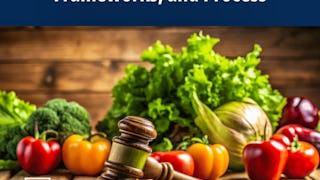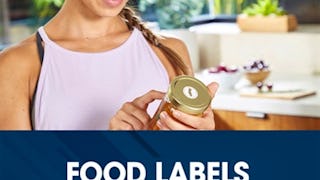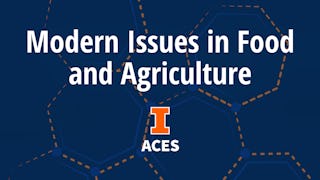Immerse yourself in the exciting realm of food regulations and labeling with our comprehensive course, perfect for learners and professionals aiming to enhance their skills. Discover the fascinating history and critical importance of food regulations and learn how key government agencies shape the food industry. Uncover the secrets behind the Nutrition Labeling and Education Act (NLEA), master the art of identifying food allergens, and explore specialty labeling options that can set products apart in the market.


您将学到什么
Understand the history, importance, and key agencies involved in US food regulation to ensure food safety and quality.
Learn the essential components of US food labels, including NLEA, allergen declarations, and specialty labeling options
Understand Nutrition Claims and Food Safety
要了解的详细信息

添加到您的领英档案
June 2025
6 项作业
了解顶级公司的员工如何掌握热门技能

积累特定领域的专业知识
- 向行业专家学习新概念
- 获得对主题或工具的基础理解
- 通过实践项目培养工作相关技能
- 获得可共享的职业证书

该课程共有4个模块
In the course orientation, you'll get to know the course, meet your classmates, explore our learning environment, and gain the technical skills you'll need. As you are introduced to Module 1, you'll learn about the critical role food regulations play in ensuring food safety, quality, and consumer protection. By the end of the module, you'll be able to explain the significance of food regulations, identify the key government agencies involved in food regulation in the U.S., and describe the main legislative acts that govern food labeling.
涵盖的内容
8个视频6篇阅读材料2个作业1个讨论话题
In Module 2, you’ll explore the foundational laws and regulations that shape food labeling in the U.S. We’ll introduce the Nutrition Labeling and Education Act (NLEA) and explain why it plays a key role in ensuring consumers receive accurate product information. You’ll learn how to identify the essential components of a U.S. food label, recognize the top 9 allergens, and locate them on ingredient lists. Finally, we’ll highlight specialty labeling options that provide additional details about certain food products sold in the U.S.
涵盖的内容
8个视频2篇阅读材料1个作业
In Module 3, you will explore the different types of nutrition claims that companies can place on food labels in the U.S. From content claims to structure function claims to health claims, you’ll learn what each type of claim means, how they are regulated, and why scientific substantiation is key to ensuring they are truthful and not misleading. We’ll also walk through the process companies must follow to use or create claims, including how they gain approval. By the end of this module, you’ll understand how claims influence consumer perception and how regulatory oversight protects public health.
涵盖的内容
8个视频2篇阅读材料1个作业
In Module 4, you will explore what it means for a food or ingredient to be “Generally Recognized as Safe” (GRAS) and how that designation is determined. You’ll also learn about key safety regulations, including Good Manufacturing Practices (GMP) and the Food Safety Modernization Act (FSMA), which help ensure the safety of the U.S. food supply. By understanding these concepts, you’ll gain insight into how food safety is maintained from production to consumption. By the end of this module, you’ll be ready to complete the final assessment and earn your Coursera certificate!
涵盖的内容
8个视频2篇阅读材料2个作业
获得职业证书
将此证书添加到您的 LinkedIn 个人资料、简历或履历中。在社交媒体和绩效考核中分享。
位教师

从 Nutrition 浏览更多内容
 状态:免费试用
状态:免费试用University of Illinois Urbana-Champaign
 状态:免费试用
状态:免费试用National Academy of Sports Medicine
 状态:免费试用
状态:免费试用University of Illinois Urbana-Champaign
 状态:免费试用
状态:免费试用University of Illinois Urbana-Champaign
人们为什么选择 Coursera 来帮助自己实现职业发展




常见问题
Yes! Although completion of the Coursera course alone is not credit-bearing, it is a required component of a graduate-level Canvas course that can be counted toward advanced credentials such as an academic (transcriptable) graduate certificate or a degree. If you decide to pursue further education, the credits you earn from this course can be applied toward a formal academic program, provided that you meet all the requirements of admission to the certificate or degree.
To access the course materials, assignments and to earn a Certificate, you will need to purchase the Certificate experience when you enroll in a course. You can try a Free Trial instead, or apply for Financial Aid. The course may offer 'Full Course, No Certificate' instead. This option lets you see all course materials, submit required assessments, and get a final grade. This also means that you will not be able to purchase a Certificate experience.
When you enroll in the course, you get access to all of the courses in the Specialization, and you earn a certificate when you complete the work. Your electronic Certificate will be added to your Accomplishments page - from there, you can print your Certificate or add it to your LinkedIn profile.
更多问题
提供助学金,

 中
中

